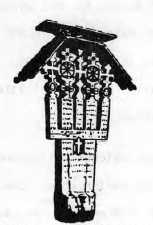Main Body
7. Melting Pot?
The melting-pot concept, now rejected but popular in the years after World War I, made life difficult for many Romanian immigrants as well as for other nationalities. American superpatriots promulgated this idea as being the only way to true and rapid Americanization of all immigrants.
The way this idea was promoted created a deep cleavage in the families of the newer immigrants between foreign-born parents and their American-born children. In school rooms and on the street, the children were told in no uncertain terms that only the English language had a place in the United States. Consequently, children whose elders spoke faulty English or with a foreign accent soon became ashamed of their parents whom the children considered as not being truly American. Many children simply refused to learn anything about the background and language of their parents and when asked about them they defiantly stated that they didn’t know it and didn’t want to know it. The stigma of bearing a foreign name and being considered a “foreigner” was a heavy burden on most children born into immigrant families.
For the parents this situation brought sadness, bitterness and confusion. Immigrant parents simply did not understand why their children were ashamed of them.
The refusal of the American-born children to learn and speak their parents’ language created a veritable vacuum in relations between immigrant elders and their American-born offspring. In a single generation, the American-born children spoke very little of their parents’ language.
In time superpatriots lost their ardor in promoting the melting pot idea, and the general public learned from experience that foreigners were as good Americans as were the advocates of super Americanism.
The second World War and the American participation in it demonstrated most dramatically that one can be proud of his immigrant background and at the same time be a good American. Millions of men and women in the American armed forces bore foreign sounding names and their courage and devotion to the cause of America was exemplary. The Romanians of Cleveland, out of a total population of 5,000, sent 460 men to fight with the American armed forces.

